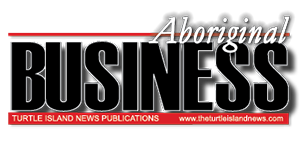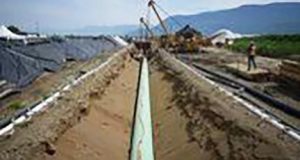By Marcus Bankuti
Local Journalism Initiative Reporter
Business deals are often made by people in suits, but they don’t often start with buying a suit.
Yet it was through finding a suit for a wedding that Mohawk Council of Kahnawake (MCK) grand chief Kahsennenhawe Sky- Deer met a close friend of Steven Steinwold, CEO of Falcon Structures Inc., who soon introduced the pair.
Steinwold had a proposition: Falcon had a contract to provide modular housing and other buildings to First Nations communities in northern Ontario, but not enough labour to build it. He proposed getting Kahnawa’kehro:non tradespeople involved.
If Kahnawake can demonstrate it has enough labour to meet the project’s needs, MCK and Falcon will form a joint venture that would see the facility move to the territory, with the community owning a 51-percent stake.
“It’s a win-win-win situation that presented itself,” said Sky- Deer.
“We have a brand that people know about because of our history building America – skyscrapers, bridges, whatever,” she said.
“Mohawks have a reputation. We have brand awareness.”
The initiative could be a fountain of local jobs and revenue, but that’s not all. Sky-Deer sees it as a potential source of long-term sustainable housing for Kahnawake and other First Nations, not to mention a way to build relationships with other Indigenous communities.
“What ends up happening is people go in and they build shoddy houses for First Nations and then within 10 years, they’re full of mould, the roofs are leaking. They’re not done well,” Sky-Deer said.
“If we make it affordable and we’re doing it because of our brothers and sisters and because we want to help, we’re going to change the model, and we’re going to change the way housing is done in First Nations communities,” Sky-Deer said.
Modular housing is prefabricated in a factory environment, which allows it to be mass produced and shipped, resulting in structures that are more affordable while achieving uniform quality standards.
“I’ve always believed that First Nations housing should be Indigenous-led,” said Steinwold. He said his company is starved for labour, needing practically as many workers as Kahnawake can provide.
He sees a lot of potential in a joint business model for Falcon and Kahnawake. “There’s a critical shortage of housing,” said Steinwold. He noted that Kahnawake’s proximity to the Seaway would make shipping cheap and easy.
Starting wages are around $22 per hour, according to Steinwold.
“It’s really good work,” said Kahnawa’kehro:non Gregory Skye, who has been at Falcon for about two months. “It’s not easy. It’s a form of construction. It’s carpentry but with steel, basically.”
Skye, a well-rounded tradesperson with 20 years experience in construction, is doing steel-stud framing at the current facility, about a 10-minute drive from Kahnawake.
“In the construction trade, out in the field, you don’t work in the rain or in the snow or when it’s too windy, because the conditions are too dangerous,” he said. In contrast, because it is indoors, Falcon can provide a dependable workweek.
Skye has taken to working out every morning before his shift at a gym accessible to all employees, another perk.
He is also glad to be contributing to providing housing to Indigenous communities. “I’m enjoying the work because I’ve been doing it for a long time, but it’s nice to be a part of it,” he said.
Marcus Bankuti is a Local Journalism Initiative Reporter who works for the
THE EASTERN DOOR. The LJI program is federally funded. Turtle Island News does not receive LJI funding.
 Aboriginal Business Magazine Your source for Aboriginal Business News
Aboriginal Business Magazine Your source for Aboriginal Business News


